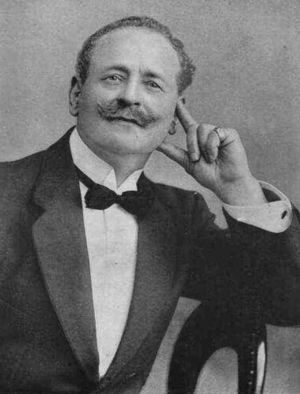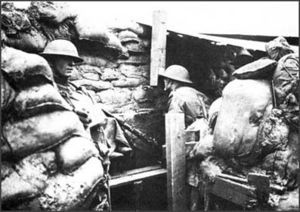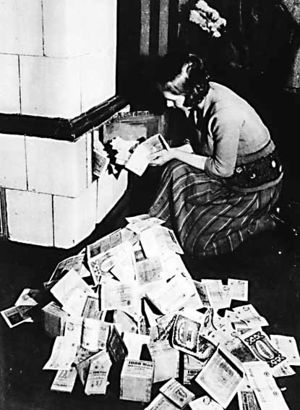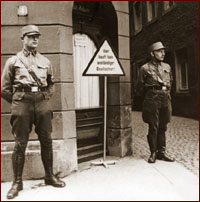Fred Reich
- Disclaimer: Any resemblance between the character written about on this page, and any real person or persons - be they alive or dead - are entirely coincidental. Really.
“Writing about the rise and fall of this chap would have been a far easier task!”
“His sandwiches impeded Aryan growth”
“He was a terrible punster, old Fred”
Fred Reich (1889 - 1945) was a renowned salesman and entrepreneur who owned a series of general stores in Germany, Austria, Hungary, Czechoslovakia, parts of Russia, Poland, and France.
Reich, who operated in the stark-days after the Great Depression, was an unusual economic success. Indeed if you were in America, to be first in the bread queue was considered awfully bourgeois, and in other countries hit hard by the depression, a bread queue was reserved only for the upper crust.
His success can be attributed to a policy of passionate salesmanship, anti-communism, putting all your ducks in a row, talking the walk, and other vapid clichés. He avoided taxes on many of his properties, infamously believing them to be "Hollow Costs". His stores were particularly popular with the Germans, who loved his Totale Aryan range of tinned food. Reich had a knack of going against current economic trends, and managed to avoid most of the pernicious anti-Semitism prominent in Germany. He killed himself in the ghetto he was sent to, with his famous suicide note reading: "Please do not let my great general stores become awful T.V. sets for soap operas".
Early Life[edit | edit source]
Reich was the son of a Jewish father, a professor, and his mother was an employee of the local bank in Arkansas, America, where Fred grew up in happy surroundings, and being surrounded by people was certainly a thing the Reich's were used to, but more the sort of surroundings one would like to escape from.
Indeed, there seemed to be contempt for the young - a local organization ran by Sheriff McHickey called "Hit the Youth" imposed absurd curfews and regulations on the young. They were allowed 20 minutes out per evening and this was between the time of 5:30 and 6:00 pm. School bullies and impotent couples flocked to the organization as means of picking on the local urchins.
Meantime, when not at school the precocious, shrewd Fred invested in the burgeoning companies started by idealistic industrialists. He profited from all of this speculation, with the companies ranging from general stores, General Motors, a company once ran by the Attorney General, and more general stores. He moved to Massachusetts, and got work as a shopkeeper, a lowly job for a man of Fred's qualifications, who could have easily studied at MIT.
Early Adulthood[edit | edit source]
Fred did not own the shop he worked at, but he ran the store with a squat chap with a minor speech impediment who looked more at home sowing seeds than stocktaking. His manager was fond of peppering him with recipes for financial success, which Fred recounted:
- Shirkers of the world unite
- A penny saved is a penny burned
- Never kick a good horse in the mouth
- Money is the root of all anvil
- Money doesn't grow on teas
Reich remembered these because they taught him how not to conduct business. Reich fell out with the manager, and being a man of potentially great statue, he was not going to let his mind be compounded with nonsense.
This exit affected Fred quite severely, his first real failure in life. He was destitute, he blamed anti-Semitism for his downfall. He claimed that anti-Semites were the enemies of good business, good religion, and good beard cultivation. Reich decided there and then that he was not going to let any anti-Semites get the better of him again. He wrote in a letter to his father: "There's no chutzpah around here father! No economic risk-taking, nothing. As long as we have to put up with anti-Semites, there will be little room for success here. Most of the world's evils are linked to this condition, not least of which is illogical thinking where people leap from one conclusion to another in the space of a sentence!"
World War I[edit | edit source]
Fred was called up to fight in World War 1. His commanding officer was a Prussian immigrant, a notorious anti-Semite. The worst battles he fought were mental ones; the CO seemed to forget whom he was fighting. Fred was once shot from behind - many suspected it was the CO, but he simply put it down to 'friendly fire'. In addition to this, he forced Fred to admit that Jesus was killed by the Jews, that he used a mixture of kosher meat and blood to clean his boots, and that Martin Luther's On the Jews and their Lies was a truthful piece of work. Whenever Fred disagreed, he was called a racist. The lonely Jew recounted:
| “ | Killing Germans was a walk in the park compared with listening to the CO's hourly rants | ” |
Rather than stand up the officer and report him for such unpleasantness, Fred polished his revolver, beat his whole regiment at chess blindfolded for the eighth time running, and deserted. He managed to get a steamboat over to Germany, where the Kaiser was King. He lodged in the village of Pfunzerzig, just outside of Munich. His Germanic-sounding last name had many mistake him for a true German, and he said his father's name was "Otto...err, Otto Bismarck...Reich". He explained his American accent by saying that he loved to watch Charlie Chaplin films. (Since the people of the small village did not know who Chaplin was, they assumed he was some talkative Yankee, maybe even a cowboy, though years later, when they got round to watching a Chaplin film they simply exclaimed "Zat's our Fuehrer!")
Storied heights[edit | edit source]
Reich had managed to bring across the money from the successful speculations he made, setting up his first general store in Munich. It was next to a popular beer hall, known as the Bürgerbräukeller. Many Germans were confused at first by the idea of a "general store" - the town mayor remarked: "Vot is zis General store? All of our Generals are dead! Ve do not vant to buy dead corpses, but bury zem!."
Reich sold anything and everything, from exceptionally long knives to rare 'night-crystals' he had smuggled over from America. He also sold various foodstuffs, cigarettes and German porn magazines, as this was the era of the wanton Weimar republic, of Berlin decadence. (Swedish ones were banned - they were too tame. Some parents in Berlin gave British 'pornography' to their children, believing it just to be as harmless as a normal bed-time story -- As well as being a form of juvenile sex education).
But this was also a time of hyperinflation - Reich was simply amazed by the prices he had to charge for things as silly as a sausage. He exploited this situation rather cruelly, as he still had an American account he could simply swap the inflated marks for dollars, with the help of an associate banker in America, who would commit suicide 10 years later.
The unrest did not really cease until 1923, and it hampered Reich's business. It was a particularly bad sign when the name of their currency was changed from the Reichsmark to the lame-sounding Rentenmark. He was baffled by the goings on Munich. He wandered down to the Beer Hall one day in 1923, and went to see if any of the hard-drinkers wanted some sandwiches making when he saw Charlie Chaplin at the front of the beerhall doing an impromptu spot of comedy, though Reich was struck by how angry (and German) Chaplin seemed to be. Reich recounted:
| “ | He seemed to be giving the sort of speeches I was giving when I was a young shmemdrik. It seemed odd that the apparent Chaplin had regressed so badly | ” |
One of the drinkers corrected Reich, telling him that he was Adolf Hitler. Hitler noticed the figure of Reich enquiring about sandwiches at the back of the hall and spat out: "Zer vill be no sandwiches today! Can't you see ve are trying to start a revolution?". Reich called the police, telling them there was a mad vegetarian in the Beer Hall, accompanied by a really boring chap called Herman who was overdressed for the occasion of a piss-up. Hitler and his gang were arrested, with Fred being awarded a fairly desultory sum of 50 billion marks for information which led to an apprehension. He did get to make a few extra sarnies out of it though.
Second crisis, second coming[edit | edit source]
Reich's business trundled along like a club cricket spinner who bowls as fast as his grandmother's old Lada at top speed. The economy was running along fine, but Fred needed something to work up against, if you know what I mean. He married a German schoolmaster called Steffi in 1928 and she took over the sandwich making duties.
Things took a further tumble when Stresemann died, leaving the chancellor position open to a host of hopefuls, which included a bumbling conservative, a bumbling incompetent, a shameless publicist, and that mad vegetarian again. First came Brüning, whose sheer incompetence at the job left many wondering how he had ever obtained the title of Doctor. It was so bad that not even the perverse Reich could succeed, nay, survive in this environment. Reich voted in elections in 1932 which were as fair as The All-Soviet Purgathon of 1936, where if you survived Stalin's wrath, you were rewarded with conscription to the brutal Red Army (who were purged a year later!), or sent to the kulaks for 'Un-Russian defiance of the Purge'.
Reich tried to blame anti-Semitism for the downfall again - "The anti-Jews will pay for their money-losing ways" he wrote in his diaries. But if he hoped for a leader to put an end to the racism in Germany, he might as well have hoped for a Medal of Honor for "Honorable Desertion". Hindenburg, was so old and senile by this point that when he sneezed, a mixture of dust and snot came out. Hinder(ance)burg let Hitler take over, who vowed to rid the world of Jewish domination and other conspiracy theories all in the name of Good Nazism.
Good Nazi[edit | edit source]
Because he was a self-hating Jew, Fred thought he would make a good Nazi. But they were not willing to let him do the hating for himself. Having said that, Fred had kept his Judaism so secret that even Jehovah forgot that he was one of the chosen. His business was doing well, for no specific reasons, but he lacked the necessary capital to expand abroad. His brother decided to help him out. He helped Fred make a 'Five-Year Plan', and indeed, it took five years before it got going.
The trouble started when a Nazi guard stormed into the general store, and inquired as to why Reich's wife was not at home, doing her bit for the Reichswifengruppen producing babies for the Hitler Youth. Steffi replied that she was at home, as she lived above the shop, and being the wife of Fred Reich himself guaranteed her automatic entry to the organization. The brainless Nazi was caught offguard by this witticism from a supposed sub-human. Therefore, SA men were posted outside of Reich's shop to deter customers from coming in. This had the opposite effect - customers thought that the Fuhrer himself thought highly of the shop by having two of his men stationed there, and they took it as approval to go on in.
Reich got a taste of Hitler's tendency to overreact to events when an Gestapo man was shot by a Jew. He ordered the death of 7 million Jews in return; Reich was not on the list, but it is no great secret that Hitler did for Jewish business what Al-Qaeda did for international air safety. Reich's windows were smashed a few months before Kristallnacht (not that this should be perceived as preferential treatment) for 'serving Jewish customers' To add insult to existing anti-Jewry, Reich was ordered to clear up the glass - rather like plying your friend with copious amounts of vodka and then having him clean up the inevitable vomit afterwards.
Angered by this, he gave his brother the go-ahead to open a general store in Austria. Reich's days of satisfied customers in Germany were now to replaced with customary satisfaction of the Nazi orders, which, let's be honest, were friendlier to earwigs than humans at times in keeping with Hitler's vegetarianism. Now, Reich's time in Austria was so bad that I have nothing to really write about it. I'll leave it to your imaginations. No, seriously. When Reich arrived in dear Vienna he didn't get serenaded by a Strauss waltz, or treated to Viennese whirls (these are not the same, idiot). This is no joke.
Cashing a Czech[edit | edit source]
So, Reich's time in Austria was as brief as the lessons on peaceable government Alexander the Great received from Aristotle. Czechoslovakia at that time seemed to be full of recent graduates from the 'Heinrich Himmler school of humanity'. Nevertheless, Reich was as passionate as ever about his salesmanship, and through the help of a friend he made a fortune as a door-to-door salesman, selling Nazi 'encyclopedias', which had the same educational value as night schools in Alabama, and were just as vicious to racial minorities.
Reich's Sisyphean work ethic, and presumable lack of conscience (something no doubt he gleaned from the Nazis) got him through. His working hours were as flexible as Jon Tickle's body, too. But I do not think we can blame him for being as hollow as a third-wave feminist's womb at this time. He did not manage to set up a store in Czechoslovakia, sensing presciently that he would be moving on elsewhere some time soon, though his 'Nazi Souvenir Shop' in Austria was doing well (being run by closet Jews), as was his original store in Germany, which was now making sandblasters for Hitler's African campaign rather than sandwiches.
This upset Fred, although his conscience was stained by working for the Nazis too. He wrote a letter to his wife calling her insensitive. She indignantly wrote back, saying:
| “ | My dear Fred, your idea of sensitivity is using a ribbed condom instead of a regular one | ” |
The truth is, Fred missed his wife, and enjoyed winding her up. He acquired another property which became a bona-fide general store in a matter of weeks as Fred was popular with the Nazis, and had therefore obtained planning permission. Meantime, he was also smuggling victims of anti-Semitism to any country which would take them (the last known evidence of Arabs and Jews working cooperatively together before this happened). Reich began to consider himself stateless, a non-American though he was born in the U.S.A: 'If a dog was born in a pen does that make it a sheep?' he would say.
Ghetto Life[edit | edit source]
Fred's cousins in France set up shops for him in Paris and Nantes. Fred was making more money than ever. However his former friends back in Pfunzerzig had discovered he was a Jew after finding a book of tunes he had supposedly penned many years ago, which suspiciously sounded like Broadway revue material. This was spurious confirmation of his Judaistic leanings, and the Nazis set about hunting him down. But before he could take a Slow Boat to China, Reich was Bewitched, Bewildered and Bothered by the Nazis. Reich was snared by a trick from a Nazi guard. The guard professed his love of Jerome Kern and his tune Jeepers Creepers; Reich did himself in by responding: 'Jeepers Creepers isn't a Kern tune, Johnny Mercer wrote it'. The guards knew they had their man and arrested him for collaborating with Jewish tunesmiths. On the same day, a Nazi guard was shot for whistling a George Gershwin tune. However, the reason for his execution was not because Gershwin was a Jewish composer. The reasons given were demoralization and false alarms; as he was whistling the overture to 'An American in Paris' whilst the Nazis were doing everything they could to keep France under Axis control, and the Gershwin melody was a secret code for invasion alerts.



